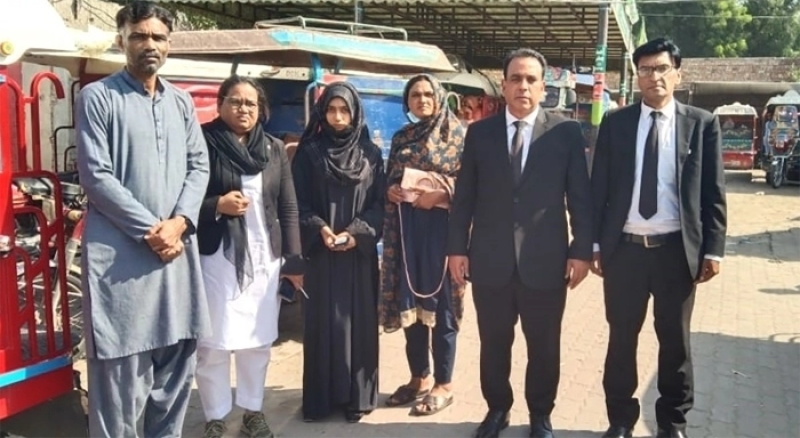
A Pakistani court has returned custody of 16-year-old Diya Iftikhar, a Christian girl, to her parents. She was reportedly kidnapped, forcibly converted to Islam, and married against her will by a local man.
The incident took place in the village of Chak No. 126-GB Sheroana, in Jaranwala, Faisalabad District, Punjab Province, on September 12. According to her parents, the abduction involved Ghazaal Jutt, along with accomplices Afzal Jutt and Ramzan Jutt. On Friday, Additional Sessions Judge Azhar Iqbal Ranjha in Jaranwala ruled in favor of a custody petition filed by Diya's mother, Shahida Iftikhar.
“Diya Iftikhar was targeted by Ghazaal Jutt because of his hatred against Jaranwala’s Christian community,” said Asher Sarfraz, chief executive of Christians True Spirit (CTS), the organization that provided legal support to Diya’s family. “The girl was abducted against her will and coerced on gunpoint to record a statement claiming that her conversion to Islam and marriage to Jutt were voluntary.”
The ordeal began when CTS filed a habeas corpus petition with the Lahore High Court seeking Diya’s recovery, but the court dismissed it on October 10. Sarfraz explained that Diya had been pressured into providing a misleading statement in favor of her captors. “It was clear that Diya was suffering from abuse and violence at the hands of her abductors, who were using marriage and conversion as a means of self-protection,” he told Christian Daily International-Morning Star News.
On Thursday, CTS filed another habeas corpus petition in the Jaranwala Sessions Court. According to Sarfraz, Judge Ranjha noticed Diya’s evident fear and anxiety, ordering everyone to leave the courtroom so she could record her statement freely. “Once Diya felt secure, she told the court that she had been converted and married against her will and wished to return to her parents’ house. Hearing this, the court handed her custody to her parents.” Police then escorted Diya and her family from the court due to concerns about possible retaliation from the suspects and their relatives.
“Diya is one of the few girls who gather the courage to expose their abductors in court; otherwise, a majority of the victims are too intimidated and fearful to speak against their oppressors,” Sarfraz said. He commended Judge Ranjha’s actions in creating a safe environment for Diya, which allowed her to speak openly. Sarfraz expressed hope that similar court protections for other victims could enable more girls to reunite with their families without fear.
Given the proximity of Ghazaal Jutt’s residence, CTS is contemplating moving Diya to a safe location to ensure her protection. “The accused lives in the same village, and it will not be safe for Diya to return to her home so soon,” Sarfraz said. He also emphasized the need for counseling support due to the physical and psychological trauma she endured over the past month.
Shahida Iftikhar expressed deep gratitude toward CTS and Christian Daily International-Morning Star News for amplifying her daughter’s plight. “My husband and I are truly grateful for the efforts made for Diya,” she said. “She is very happy to be back with her family. She has endured a lot of suffering, but we have faith that God’s grace will help her in recovering and leading a normal life again.”
Rights advocates highlight that young girls in Pakistan, some as young as 10, are frequently subjected to forced conversions and marriages, a practice that remains widespread in various parts of the country. Advocates claim that the judiciary often disregards critical evidence of the victims’ ages, resulting in girls being returned to their captors under the guise of “legal wives.”
In 2023 alone, the Center for Social Justice recorded 136 cases of abduction and forced conversion—the highest annual total on record. Among these, 110 Hindu girls were abducted in Sindh Province, and 26 Christian girls in Punjab Province, with minors constituting 77% of the cases.
Church leaders and rights activists stress the urgent need for Pakistan to address forced marriage and religious conversion cases with fairness and urgency, ensuring that victims receive protection and that perpetrators face justice.
In 2024, Pakistan retained its seventh-place ranking on Open Doors’ World Watch List of the most difficult places to be a Christian.



















